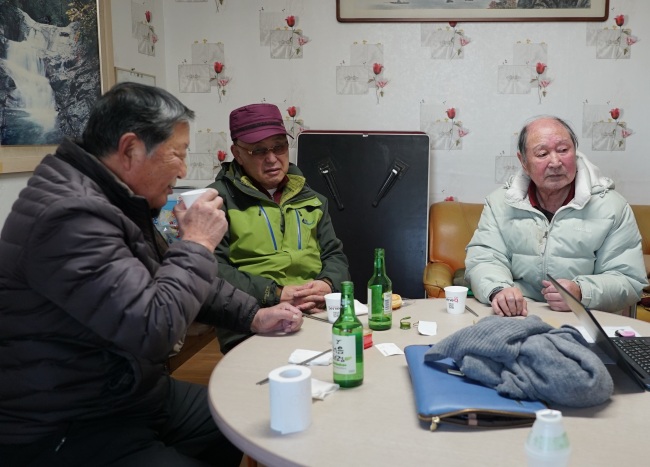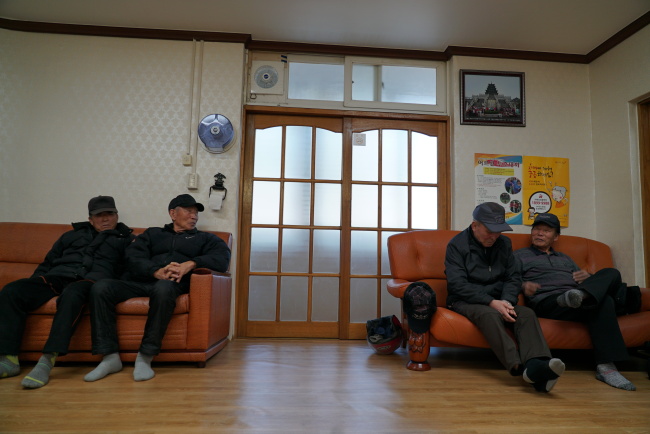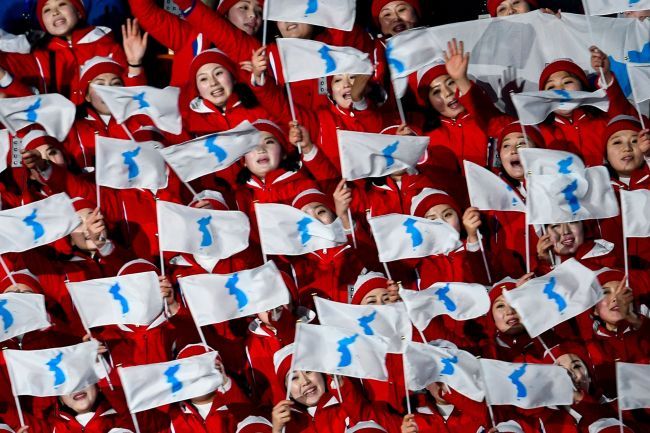[FEATURE] In Sokcho, elderly Koreans miss their parents' hometown in North Korea
By Claire LeePublished : April 26, 2018 - 16:16
SOKCHO, Gangwon Province -- Kim Cheol-sub says he can barely sleep these days. Born in 1937 in Bukcheong, a city in South Hamgyong Province in today’s North Korea, the 81-year-old says the upcoming inter-Korean summit gives him both a sense of despair and excitement.
“I just have too many thoughts in my mind,” Kim told The Korea Herald. “I don’t trust the North Korean regime. But thinking about my siblings in the North keeps me awake at night. Perhaps I might be able to see them once more before I die.”
Kim is one of many North-Korean-born men and women living in Sokcho, a coastal city in South Korea’s Gangwon Province, just about an hour away from PyeongChang -- where this year’s winter Olympics took place. Some 1,577 Koreans born between 1900 and 1940, originally from today’s North Korea, settled here in the 1950s after being forced to leave their hometowns during the Korean War (1950-1953).
“I just have too many thoughts in my mind,” Kim told The Korea Herald. “I don’t trust the North Korean regime. But thinking about my siblings in the North keeps me awake at night. Perhaps I might be able to see them once more before I die.”
Kim is one of many North-Korean-born men and women living in Sokcho, a coastal city in South Korea’s Gangwon Province, just about an hour away from PyeongChang -- where this year’s winter Olympics took place. Some 1,577 Koreans born between 1900 and 1940, originally from today’s North Korea, settled here in the 1950s after being forced to leave their hometowns during the Korean War (1950-1953).

According to researchers at the Sokcho Museum, about 90 percent of them are from South Hamgyong Province, bordered on the south by South Korea’s Gangwon Province -- where Sokcho is located -- and on the east by the East Sea. Many of them worked as fishermen or in ship businesses back home -- Sokcho, a coastal town, was a relatively easy place for them to settle.
Today, Sokcho is known for its scenic waters and North Korean-style cuisine introduced by the settlers. One can easily spot restaurants that serve the North’s Hamgyong province-style sundae, a type of blood sausage, and pickled seafood dishes. Most of the settlers born in the 1900s and 1910s -- are no longer around. Those of North Korean origin in Sokcho today are people who moved to the South as youngsters, some with their parents, some without.
Kim fled to the South only with his father -- leaving his mother and two younger siblings behind. It was right after the Jan. 4, 1951 retreat during the Korean War, when Seoul was captured for the second time by Chinese and North Korean forces. He was 14 at the time.
“It was total chaos at the time, and all adult men and male teenagers were frantically told to leave,” Kim told The Korea Herald.
“They said if we stayed, we’ll be forced to join the North Korean army, and even be killed. So my father just took me with him to the South. My mother was devastated. But we thought we’d meet again after the war. Obviously that did not happen. Thinking about my mother has always pained me, but it’s even harder to cope these days. I’ve always felt guilty that my father and I left her behind. We should’ve brought her with us. That sense of guilt basically dominated my life in the South. There is now no way of escaping it, because she died without ever seeing me again.”

Kim was reunited with his two siblings in the 2000s, through a government reunion program during the Kim Dae-jung administration and private brokers. He met his younger sister in a Chinese city bordering North Korea in 2000, and his younger brother in 2002. Through these meetings he learned that his mother had passed way in 1991, and that she suffered harsh labor and discrimination as her husband had fled to the South.
His father, on the other hand, suffered from alcoholism throughout his life in the South.
Although Kim had been longing to meet his siblings prior to the reunion, the meetings did not have a happy ending. During the first meeting with his sister, Kim said he gave her $3,000 worth of cash, as well as other daily necessities as gifts. He later learned in 2002, through his brother, that his sister eventually had to give up all the gifts and cash that he had given her, as the North Korean authorities forcibly took them away. Kim said this made him feel extremely helpless, as well as guilty, for having left them in the North.
“It was heartbreaking to see them praising the North Korean leaders, and saying that they were doing well and grateful, when it was obvious that wasn’t their reality,” he told The Korea Herald.
“And that each meeting was the first and the last time I was going to see each of my two siblings. That was very hard to deal with.”
Kim said after his meeting with his brother in 2002, he became severely depressed -- to a point where he thought about taking his own life.
Kim Geon-wook, 85, another Sokcho resident, has a similar story. Kim Geok-wook also left his hometown of Jeonjin in South Hamgyong Province, with his father and brother, to avoid conscription by the North Korean military. He was 17 at the time. His mother and sister were left behind.
“It was so hectic when we left,” he said. “I couldn’t even say good bye to my mother.”
But as soon as he left Jeonjin, Kim said he was “too hungry” to miss his mother. His father died two years after they left home. Kim says he is still traumatized by his father’s death, the fact that he could not do anything while his father lay on the floor, dying.
“We had one sweet potato a day, if we were lucky. There were many days when we had no food,” he told The Korea Herald.
“My father struggled to find a job in the South. He got sick after working at a fishery in the winter. He didn’t have any warm clothes. We could not afford any medicine. There was nothing that I could do to help him.”

Kim soon found a job as a driver for the US military stationed in Busan, and later moved northward to Sokcho. One of his reasons was that Sokcho -- its waters and the high mountains -- reminded him of his hometown.
“I’m old now and I don’t have many days left. And really, throughout the nearly 80 years of my life, what I wanted was rather simple.” he said.
“For many of us, (the upcoming summit) is too late. My mother isn’t alive anymore. I never got to cook or treat her to a nice meal and say that I‘m sorry. Not even once. But that’s all I wanted my whole life -- treating my mother to a nice meal. And that simple wish was somehow never fulfilled.”
*
My mother was born in Sokcho in 1960. Like many of the displaced Koreans who have settled in Sokcho, her parents were also from Bukchoeng, a coastal city in South Hamgyong Province in today’s North Korea. My maternal grandmother passed away when I was six, my grandfather when I was 12.
My grandmother was a generous and kind soul. She let me get away with things most of the time. When I was with her, I didn’t have to do my weekly math assignments. I was a picky eater as a child; my grandmother would cook my favorite dishes, and wouldn’t say anything even if I didn’t finish my meal. Apparently I was her favorite grandchild because I was the first child of her only daughter -- she had six sons before having my mother, her youngest child -- and because she and I were both born in the year of the tiger. She was born in 1926, I in 1986.

My mother was crushed when her mother abruptly passed away from a heart attack in 1991. I was too young to understand much at her funeral. But I still remember the toffee-nut color of an eraser and a pencil she bought me at a department store a few weeks before her death. She had bought me those only because I simply glanced at them.
I was a teenager when my mother briefly mentioned that her parents were separated from their eldest son before the Korean War. They had left the young boy with my grandfather’s mother in Bukcheong, thinking they would be able to return to their hometown someday. My grandfather owned a ship business and, like many Hamgyong Province-born displaced Koreans, he took one of his own vessels to flee to the South, not realizing he would never see his mother and his child. The country was divided following the Korean War and my grandparents never got to see their eldest son again.
Although my mother did not offer many details and she never brought up the subject again, the story nevertheless affected me. It was the kind of story that changes you at your core in an irreversible way. When I became a journalist, I had no desire to cover inter-Korean relations or North Korea. I couldn’t relate to the politics and spectacle ceaselessly produced by the media at home and overseas. North Korea was my grandmother’s hometown. She had left her son there. She died without getting to see him ever again.
I have one particular recurring memory of my grandmother. I remember her bursting into tears while talking to my mother. The only words I could understand from her were “sea” and “motion sickness.” I remember asking her, “Grandma, why are you crying? Why are you crying?” I remember her telling me, while wiping her tears and trying to smile. “I’m crying because you are too cute.”
In Sokcho, I asked Song Su-hak, another displaced Korean who fled to the South in 1950, at the age of 12, by taking a boat trip. I asked him about seasickness, as that is one of the very few clues I had about my grandmother’s life before my mother was born.
“It was awful,” the 80-year-old said. “It was like a living hell. The boat was crowded and all I remember is throwing up while others were also throwing up.”
*
At this year’s PyeongChang Games, I watched North Korean cheerleaders -- all young and female -- cheering for the joint South-North Korean women’s ice hockey team. It was my first time seeing so many North Koreans -- not North Korean defectors -- all at once. It was rather bizarre to witness their highly-drilled repertoire of chants and synchronized dances. While performing the songs that I could not recognize, they kept chanting, “We are one, we are one!” I certainly did not feel like one of them.
But when they started singing the only song that I knew in their repertoire, something began to change. It was “Spring in My Hometown,” a popular Korean folk song written in the 1920s, well before the division of the two Koreas. Like most South Korean millennials, I learned the song in elementary school music class. Sitting in the hockey stadium listening to the familiar lyrics sung by the North Korean women -- “My old home deep in the flowery mountains/ Of peach blossoms, apricots and baby azaleas” -- I was reminded of my grandparents, who never got to return to their hometown, the only reminder that the cheerleaders and I were somehow connected.

I can only guess that my grandmother must have regretted again and again her decision to leave her hometown without her eldest child, that his birthdays must have been painful for her and her husband. She never got to find out whether her son survived the war or not, and must have wondered her whole life. I don’t know what it means to live with a memory like that, without ever reaching any sense of closure. All I know is I probably never will.
But unlike before, I now often wonder. I wonder if I, as a child, ever reminded her of her son left in the North. I wonder what she missed the most about her hometown. I wonder what it is to be born and grow up in a coastal town and then spend your final years in a grey apartment complex in northern Seoul. I wonder what she would have wanted to tell her eldest son if they ever got to meet again. I wonder if her son is still alive, somewhere in today’s North Korea. I wonder if I have any cousins in North Korea.
Spring is literally -- and finally -- here, and after a dramatic turn of events, the two Koreas are now talking about officially ending the war. For some aging Koreans in Sokcho, the discussions give them the hope that they may be able to fulfill their late parents’ wish.
“Of course I want to visit my hometown, of course,” said Kim Eui-jun, 73, originally from Bukcheong. He was six years old when he left his hometown in the North.
“When my parents were alive, they would repeatedly draw the map of Bukcheong and show it to me. I hope I can at least bring their ashes to the North and bury them there. It’s something that I hope I can do for my parents during my lifetime, before I join them in heaven.”
I think about the number of springs that my grandparents, along with so many others who left their families in the North, had to endure without their loved ones. I think about time’s irreversible nature, and the fact that no peace treaty would bring back the countless days and nights that the now-deceased Koreans were forced to spend without each other. If a massive forced migration triggered by an armed conflict, on top of family separation that lasted more than half of a century, is not a form of injustice, I don’t know what is.
This spring, more than anything, I am reminded of an identity of mine that I haven’t been always conscious of -- like many other Koreans, I am, and always have been, a descendant of refugees. And I hope whatever will come after the upcoming summit will serve justice to the dead, especially their now-silent wishes and longings.
By Claire Lee (dyc@heraldcorp.com)


![[AtoZ into Korean mind] Humor in Korea: Navigating the line between what's funny and not](http://res.heraldm.com/phpwas/restmb_idxmake.php?idx=644&simg=/content/image/2024/04/22/20240422050642_0.jpg&u=)
![[Exclusive] Korean military set to ban iPhones over 'security' concerns](http://res.heraldm.com/phpwas/restmb_idxmake.php?idx=644&simg=/content/image/2024/04/23/20240423050599_0.jpg&u=20240423183955)



![[Graphic News] 77% of young Koreans still financially dependent](http://res.heraldm.com/phpwas/restmb_idxmake.php?idx=644&simg=/content/image/2024/04/22/20240422050762_0.gif&u=)

![[Herald Interview] Why Toss invited hackers to penetrate its system](http://res.heraldm.com/phpwas/restmb_idxmake.php?idx=644&simg=/content/image/2024/04/22/20240422050569_0.jpg&u=20240422150649)




![[Exclusive] Korean military to ban iPhones over security issues](http://res.heraldm.com/phpwas/restmb_idxmake.php?idx=652&simg=/content/image/2024/04/23/20240423050599_0.jpg&u=20240423183955)



![[Today’s K-pop] Ateez confirms US tour details](http://res.heraldm.com/phpwas/restmb_idxmake.php?idx=642&simg=/content/image/2024/04/23/20240423050700_0.jpg&u=)